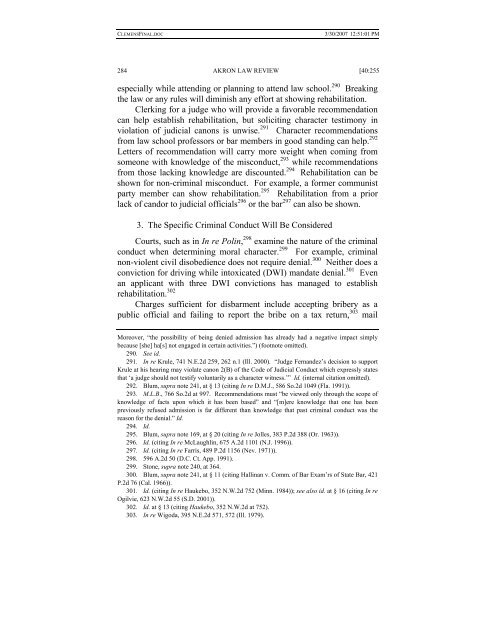Facing the Klieg Lights: Understanding the "Good Moral Character"
Facing the Klieg Lights: Understanding the "Good Moral Character"
Facing the Klieg Lights: Understanding the "Good Moral Character"
Create successful ePaper yourself
Turn your PDF publications into a flip-book with our unique Google optimized e-Paper software.
CLEMENSFINAL.DOC<br />
3/30/2007 12:51:01 PM<br />
284 AKRON LAW REVIEW [40:255<br />
especially while attending or planning to attend law school. 290 Breaking<br />
<strong>the</strong> law or any rules will diminish any effort at showing rehabilitation.<br />
Clerking for a judge who will provide a favorable recommendation<br />
can help establish rehabilitation, but soliciting character testimony in<br />
violation of judicial canons is unwise. 291 Character recommendations<br />
from law school professors or bar members in good standing can help. 292<br />
Letters of recommendation will carry more weight when coming from<br />
someone with knowledge of <strong>the</strong> misconduct, 293 while recommendations<br />
from those lacking knowledge are discounted. 294 Rehabilitation can be<br />
shown for non-criminal misconduct. For example, a former communist<br />
party member can show rehabilitation. 295 Rehabilitation from a prior<br />
lack of candor to judicial officials 296 or <strong>the</strong> bar 297 can also be shown.<br />
3. The Specific Criminal Conduct Will Be Considered<br />
Courts, such as in In re Polin, 298 examine <strong>the</strong> nature of <strong>the</strong> criminal<br />
conduct when determining moral character. 299 For example, criminal<br />
non-violent civil disobedience does not require denial. 300 Nei<strong>the</strong>r does a<br />
conviction for driving while intoxicated (DWI) mandate denial. 301 Even<br />
an applicant with three DWI convictions has managed to establish<br />
rehabilitation. 302<br />
Charges sufficient for disbarment include accepting bribery as a<br />
public official and failing to report <strong>the</strong> bribe on a tax return, 303 mail<br />
Moreover, “<strong>the</strong> possibility of being denied admission has already had a negative impact simply<br />
because [she] ha[s] not engaged in certain activities.”) (footnote omitted).<br />
290. See id.<br />
291. In re Krule, 741 N.E.2d 259, 262 n.1 (Ill. 2000). “Judge Fernandez’s decision to support<br />
Krule at his hearing may violate canon 2(B) of <strong>the</strong> Code of Judicial Conduct which expressly states<br />
that ‘a judge should not testify voluntarily as a character witness.’” Id. (internal citation omitted).<br />
292. Blum, supra note 241, at § 13 (citing In re D.M.J., 586 So.2d 1049 (Fla. 1991)).<br />
293. M.L.B., 766 So.2d at 997. Recommendations must “be viewed only through <strong>the</strong> scope of<br />
knowledge of facts upon which it has been based” and “[m]ere knowledge that one has been<br />
previously refused admission is far different than knowledge that past criminal conduct was <strong>the</strong><br />
reason for <strong>the</strong> denial.” Id.<br />
294. Id.<br />
295. Blum, supra note 169, at § 20 (citing In re Jolles, 383 P.2d 388 (Or. 1963)).<br />
296. Id. (citing In re McLaughlin, 675 A.2d 1101 (N.J. 1996)).<br />
297. Id. (citing In re Farris, 489 P.2d 1156 (Nev. 1971)).<br />
298. 596 A.2d 50 (D.C. Ct. App. 1991).<br />
299. Stone, supra note 240, at 364.<br />
300. Blum, supra note 241, at § 11 (citing Hallinan v. Comm. of Bar Exam’rs of State Bar, 421<br />
P.2d 76 (Cal. 1966)).<br />
301. Id. (citing In re Haukebo, 352 N.W.2d 752 (Minn. 1984)); see also id. at § 16 (citing In re<br />
Ogilvie, 623 N.W.2d 55 (S.D. 2001)).<br />
302. Id. at § 13 (citing Haukebo, 352 N.W.2d at 752).<br />
303. In re Wigoda, 395 N.E.2d 571, 572 (Ill. 1979).
















